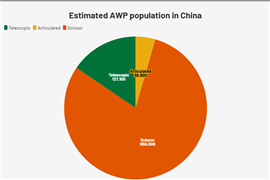What is adjudication and how can it be used to resolve construction disputes?
28 March 2024
 Image: Ratirath via AdobeStock - stock.adobe.com
Image: Ratirath via AdobeStock - stock.adobe.com
The sole aim of everyone involved in a construction project is to get the job done on time and within budget.
Unfortunately, with the opinions of so many different stakeholders at play, disagreements regularly arise over how things should be done.
While most arguments are resolved as quickly as they arise, some can threaten to derail the project and must be carefully managed to keep it on track.
The adjudication process, which is commonly used in countries like the UK, Ireland, Australia, New Zealand, Hong Kong, Singapore, and Malaysia, enables those involved in a construction dispute to resolve their issues quickly and in a more cost-effective way than going to court or arbitration.
So what is the role of adjudication in the construction industry and what are the key stages of the adjudication process?
What is the role of adjudication in construction disputes?
Adjudication is a fast and cost-effective form of dispute resolution. The process takes just 28 days from start to finish, in stark contrast to the many months (often exceeding 12 months) a construction dispute can take to litigate.
Adjudication was introduced to protect cash flow, often referred to as the ‘lifeblood’ of the construction industry and avoid construction projects being delayed and disrupted by stakeholder disagreements.
The principle of adjudication is that an impartial expert confidentially decides the outcome of a contractual dispute, and their decision is immediately binding.
Adjudication can be used to resolve various types of disputes arising from a construction contract, including those relating to time extensions, payment, and defects. Adjudication isn’t a permanent solution; the outcome of an adjudication only holds until the dispute is decided through another dispute resolution method, such as arbitration or litigation. In reality, though, the parties more often than not consider the issue closed following the adjudicator’s decision and put the matter behind them.
What are the advantages of adjudication?
Adjudication has several key advantages, which include the following:
Speed - An adjudicator generally gives their decision within 28 days, so the parties get a quick resolution.
Cost - Adjudications can be extremely cost-effective, particularly compared to other forms of dispute resolution, such as litigation.
Confidentiality - The process is entirely confidential, so the parties’ reputations remain intact.
Immediately binding - The adjudicator’s decision is binding as soon as it is made, so the parties can focus their energy on completing the project.
Project continuity - The project can continue during the adjudication process, which only takes a matter of weeks.
What are the disadvantages of adjudication?
While adjudication is generally the preferred method of dispute resolution for many in the construction industry, the process is not without its critics. Many of the process’s perceived advantages are also considered shortcomings in certain circumstances.
Speed - The swiftness of the adjudication process is generally considered one of its greatest advantages. The speed comes at the expense of a detailed investigation of the evidence, making it potentially unsuitable for complex cases. If you are on the wrong end of a decision, you may have to pay up significant sums quickly.
Cost - Most parties involved in adjudications use legal representatives, particularly if they are large companies with deep pockets. Unfortunately, the parties are generally not entitled to recover their costs from the other side, even when successful, so they can be left out-of-pocket.
Adjudicator’s decision may be binding even if flawed - Even if an adjudicator makes a mistake in their decision, it is usually binding on the parties. Since the purpose of adjudication is to resolve issues swiftly and avoid the derailment of a construction project, the general approach is ‘pay now, argue later’. So, unless exceptional circumstances exist, the party who feels wronged must swallow the result and argue the point through a different dispute resolution process.
An interim, not a permanent solution - An adjudicator’s decision is immediately binding, but unhappy participants retain the right to have the issue retested through another dispute resolution method.
Challenge to adjudicator’s decision - In the UK, while a decision is immediately binding, it may be necessary to obtain summary judgment in the Technology and Construction Court to proceed to enforce the adjudicator’s decision. Whilst the approach the courts usually take is to do everything possible to uphold decisions, there are sometimes challenges to adjudicator’s decisions on specific grounds (as referred to below).
What are the key stages of the adjudication process?
Adjudication was initially intended to be a largely informal process, often referred to as a ‘quick and dirty’ way of resolving construction disputes. There are certain stages that the adjudication inevitably follows, an adjudication will more often than not involve witness statements and expert evidence which is put in the below referred stages.
The key stages of the adjudication process in the UK are as follows:
Check that the dispute is eligible for adjudication.
Not all construction disputes are eligible for adjudication. The dispute must arise from a construction contract, although this does not need to be in writing. The dispute must have ‘crystallised’, meaning one party has raised their concerns, and the other has rejected them.
Notice of Adjudication - The party who wishes to adjudicate (known as the ‘referrer’) begins the process by serving a Notice of Adjudication on the other side.
Adjudicator appointment - Within seven days of service of the Notice of Adjudication, the parties must appoint an adjudicator.
Referral Notice - Seven days after serving their Notice of Adjudication, the referrer must serve a referral notice containing full details of their claim.
Response - The response is essentially the responding party’s defence to the claim. It is usually served within 7-14 days of the referral notice.
Adjudicator’s decision - The adjudicator must reach their decision within 28 days of the referral notice being served. The decision binds the parties, who must comply with it even if they intend to pursue another form of dispute resolution.
How long does the adjudication process usually take?
The adjudication process is quick. It follows a 28-day timetable, although this can sometimes be extended for short periods, such as if the responding party needs more time to formulate their response.
Are the decisions made through adjudication legally binding?
An adjudicator’s decision binds the parties on an interim basis. Either party can pursue the matter through another dispute resolution method, such as litigation, if they wish. In practice, most participants in a construction adjudication accept the decision and move on.
Can I appeal an adjudication decision?
You cannot appeal an adjudication decision to a separate adjudicator and can only challenge through the courts in very limited circumstances. Examples of instances which may give rise to a challenge through the court include if the adjudicator did not have the power to decide the issue or their decision was not impartial. If either party is unhappy with the interim result, they can pursue the case through other forums (such as the Court), to obtain a final determination of the issues in dispute.
Summary
The general view amongst those in the construction industry is that adjudication works. It enables participants to resolve disputes quickly, supports cash flow and allows a project to continue in spite of any issues that arise between stakeholders.
Adjudication has its drawbacks, particularly in the context of complex, high-value disputes. The speed of the process makes it difficult for parties to present large volumes of documentation or evidence, and their limited ability to challenge an arbitrator’s decision, even when apparently flawed, can be incredibly frustrating.
The parties can reduce the downsides of the process by ensuring they present their cases in a clear, coherent manner, and choose an adjudicator with the requisite skill and experience to reach a fair decision.
Michael Key is a business dispute solicitor at Harper James.
|
STAY CONNECTED



Receive the information you need when you need it through our world-leading magazines, newsletters and daily briefings.
CONNECT WITH THE TEAM












